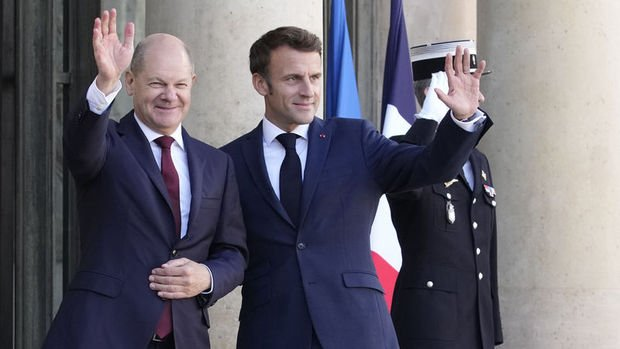France and Germany state "continue support" for Ukraine
French President Emmanuel Macron and German Chancellor Olaf Scholz announced that they will continue their support for Ukraine. French President Macron, German Chancellor Scholz, French National Assembly President Yael Braun-Pivet, German Bundestag President Baerbel Bas, French and German officials, and a large number of guests attended the ceremony held at the Sorbonne University in Paris to mark the 60th anniversary of the France-Germany friendship treaty, also known as the “Elysée Treaty.” In his speech here, Macron used the phrase, “For a Frenchman, speaking of Germany is always speaking of a part of himself,” and touched on the importance of the Elysée Treaty, signed on January 22, 1963 between former German Chancellor Konrad Adenauer and former French President Charles de Gaulle, for the two countries, Europe, and the world. Pointing out that the 60th anniversary of the Elysee Agreement carries a special meaning at a time when Ukraine is resisting Russian occupation and the ideals of peace and dialogue are being violated, Macron said, “Our unwavering support for the Ukrainian people in all areas will continue.” President Macron stated that they will continue to support Ukraine and Moldova for being granted European Union (EU) candidate country status. Noting that France and Germany should be pioneers in the reconstruction of Europe, Macron emphasized that the two countries should also take the lead in developing various elements such as building a new energy model and encouraging and accelerating the investments necessary for the energy transformation at the European level. Macron added that the 23rd France-Germany Council of Ministers Meeting will be held in Paris today. “The challenges have changed” Prime Minister Scholz reminded that the Elysee Agreement was signed less than 20 years after World War II, and explained that the French-German reconciliation paved the way for the reunification of Europe. “The challenges that we as Europeans have changed.” Scholz stated that the issue now was to protect the EU and its principles, especially against external threats. Olaf Scholz made the following assessment: "Russian President (Vladimir) Putin has imperialist aims. He is trying to change borders with force. Ukrainians are paying a heavy price for this. However, Putin's imperialism will not prevail." Emphasizing that they would not allow a return to a period in Europe where violence replaced politics, Scholz said, "We will continue to give Ukraine all the support it needs for as long as necessary to defend our European peace project." Stating that Ukraine, Moldova, and the six Balkan countries were part of the European family and that Georgia would also be a part of this family in time, Scholz touched on the need for institutional reform in the EU and the importance of the development of European fighter jets and tanks in France and Germany. The speakers of the parliaments of both countries also drew attention to the importance of the French-German friendship in their speeches.


